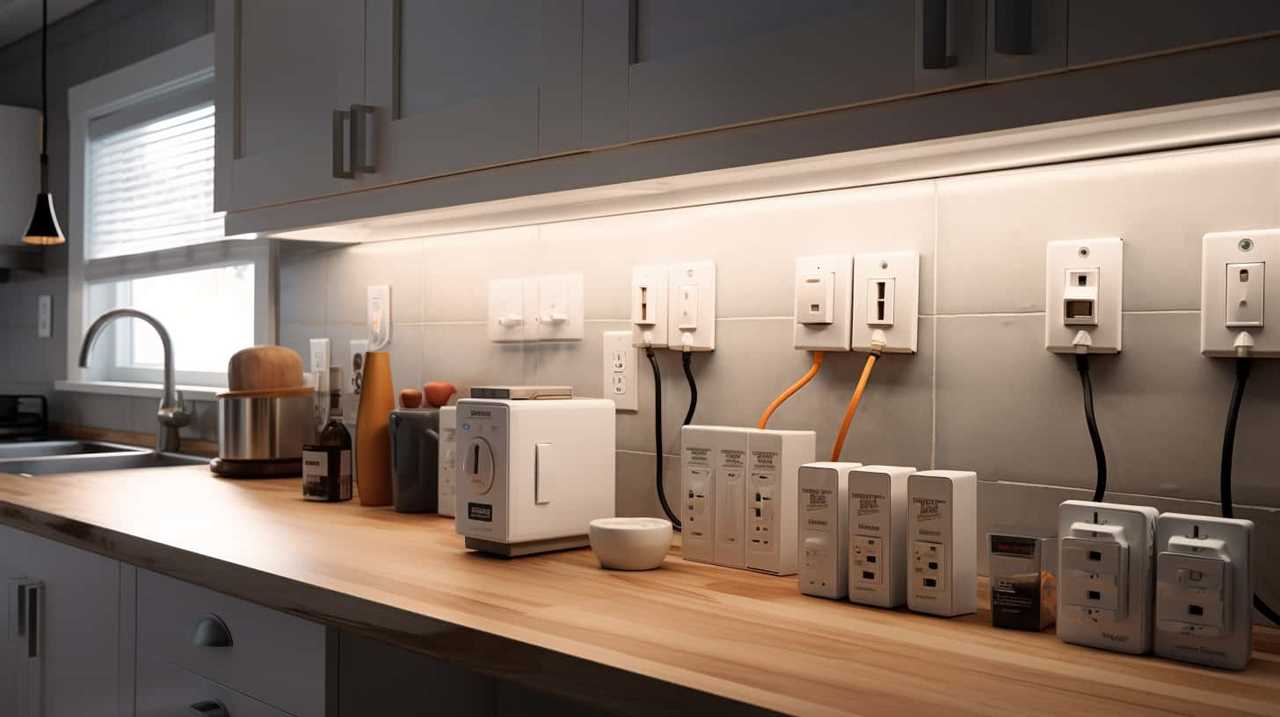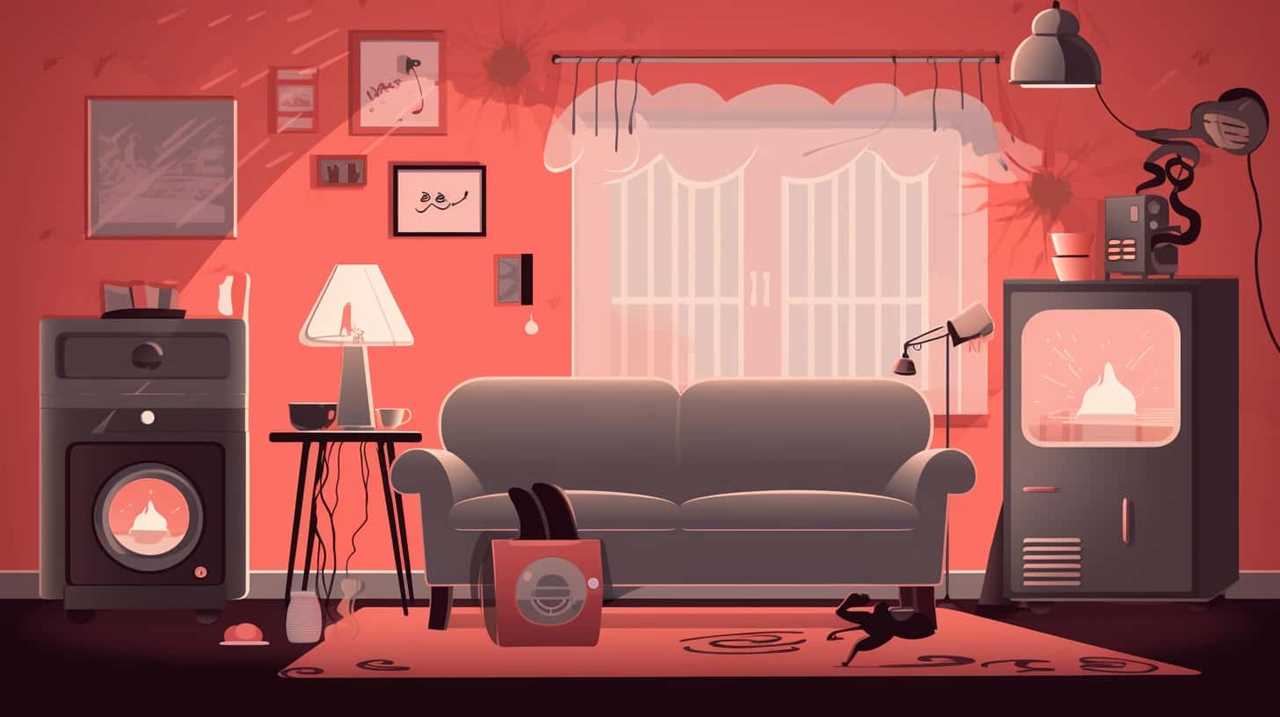In today’s modern world, energy efficiency and environmental conservation are incredibly important considerations. This has sparked interest in whether unplugging appliances could lead to potential damage.
This inquiry arises from the misconception that leaving appliances plugged in at all times is necessary for their longevity and functionality. To delve deeper into this matter, it is essential to understand the impact of unplugging appliances, the benefits it may bring, and any potential wear and tear that can occur.
By exploring the relationship between unplugging appliances and energy consumption, as well as considering safety concerns and power outages, individuals can make informed decisions regarding the efficient use of their appliances.
Key Takeaways
- Unplugging appliances can save energy and reduce power usage, leading to lower electricity bills.
- Unplugging appliances helps increase their lifespan by reducing wear and tear on internal components.
- There is a misconception that unplugging appliances does not cause any damage or decrease their performance.
- Frequent unplugging can lead to wear and tear on electrical components, such as power cords and plugs, and may have long-term consequences on appliances.
Understanding the Impact of Unplugging Appliances
Understanding the Impact of Unplugging Appliances can help consumers make informed decisions about their energy usage and potential damage to their appliances. Energy conservation is a critical aspect of reducing carbon emissions and minimizing our ecological footprint. Unplugging appliances when not in use is a simple yet effective way to save energy and reduce power usage. By doing so, consumers can significantly contribute to the overall conservation of energy resources.

When appliances are left plugged in, they continue to draw power even when not actively being used. This standby power, also known as vampire power or phantom loads, accounts for a significant portion of energy wastage in households. Unplugging appliances not only saves energy but also helps to lower electricity bills.
Moreover, unplugging appliances can also prevent potential damage. Power surges and voltage spikes can occur at any time, and leaving appliances plugged in can make them susceptible to these electrical disturbances. By unplugging appliances when not in use, consumers can protect their appliances from potential damage caused by power fluctuations.
The Benefits of Unplugging Appliances
Unplugging appliances not only saves energy and reduces power usage, but it also provides a range of benefits for consumers. Here are three key benefits of unplugging appliances:
- Energy savings: By unplugging appliances when not in use, you can significantly reduce your energy consumption. Many appliances continue to draw power even when they are turned off, a phenomenon known as ‘standby power’ or ‘phantom load.’ Unplugging these appliances prevents them from consuming energy unnecessarily, leading to energy savings and reduced electricity bills.
- Increased appliance lifespan: Unplugging appliances when not in use helps extend their lifespan. The constant flow of electricity can cause wear and tear on the internal components, leading to premature failure. By unplugging appliances, you reduce the stress on their electrical systems, ensuring they last longer and operate efficiently.
- Fire prevention: Unplugging appliances eliminates the risk of electrical fires caused by faulty wiring or short circuits. When appliances are plugged in, there is always a small chance of electrical malfunctions that can lead to fires. By unplugging appliances, you minimize this risk and create a safer environment for yourself and your home.
Common Misconceptions About Unplugging Appliances
There are several common misconceptions regarding the practice of unplugging appliances, which can hinder people from fully understanding its benefits and potential drawbacks. Let’s debunk some of these misconceptions and shed light on the truth.

One common misconception is that unplugging appliances doesn’t have a significant impact on energy bills. However, this is far from the truth. Even when appliances are turned off, they still consume standby power, also known as vampire power. Unplugging them completely eliminates this unnecessary energy usage, resulting in noticeable savings on your energy bills.
To further illustrate the impact of unplugging, consider the following table:
| Appliance | Standby Power Consumption (Watts) |
|---|---|
| Television | 5-10 |
| Computer | 2-10 |
| Microwave | 1-5 |
As you can see, these seemingly small amounts of standby power can add up over time. By unplugging appliances, you can reduce your energy consumption and save money.
Now that we have debunked the misconception about the impact on energy bills, let’s explore whether frequent unplugging causes wear and tear on appliances.

Does Frequent Unplugging Cause Wear and Tear
Frequent unplugging of appliances can potentially cause wear and tear over time.
The act of repeatedly plugging and unplugging an appliance can lead to the wearing down of electrical components, such as the power cord and the plug itself.
This can result in a decrease in the overall performance and lifespan of the appliance.
Unplugging: Long-Term Consequences
The repeated act of disconnecting appliances from power sources may lead to gradual wear and tear over time. While frequent unplugging may seem like a responsible choice to save energy and reduce electricity bills, it is important to consider the long-term consequences it may have on the appliances themselves.

Here are three potential wear and tear consequences of frequently unplugging appliances:
- Increased stress on electrical connectors: Frequent plugging and unplugging can cause the connectors to wear out, resulting in loose connections and potential electrical issues.
- Wear on power cords: Repeated bending and twisting of power cords during the unplugging process can weaken the wires, leading to fraying or breakage.
- Degraded insulation: Constant exposure to air and temperature fluctuations when unplugged can cause the insulation on wires to deteriorate, increasing the risk of electrical hazards.
It is essential to weigh the energy efficiency benefits against the potential long-term damage to appliances before making a decision to frequently unplug them.
Wear and Tear: Significant Impact?
While frequent unplugging of appliances may be seen as a responsible energy-saving choice, it is important to consider the potential significant impact it can have on wear and tear.
The act of repeatedly plugging and unplugging appliances can put stress on their electrical components, leading to accelerated wear and potential damage over time. This is particularly true for appliances with delicate internal mechanisms, such as refrigerators, air conditioners, and washing machines.

The constant power cycling can cause increased friction and heat generation, which can eventually lead to the breakdown of critical parts. Additionally, frequent unplugging and replugging can also introduce the risk of loose connections, which can further exacerbate wear and tear.
Therefore, while energy consumption is an important consideration, it is equally crucial to weigh the long-term consequences of frequent unplugging on appliance durability.
Unplugging Appliances and Energy Consumption
When it comes to energy consumption, unplugging appliances can have a significant impact. By unplugging appliances when not in use, energy can be saved, reducing electricity bills and overall energy consumption.
However, there is also the question of whether constantly unplugging appliances can affect their lifespan, as well as the consideration of using standby mode as an alternative to full unplugging.

These points will be explored further to provide a comprehensive understanding of the relationship between unplugging appliances and energy consumption.
Energy Saved When Unplugged
Unplugging appliances can result in energy savings through reduced energy consumption. When appliances are plugged in, they continue to draw a small amount of electricity, even when not in use. By unplugging them, you can conserve energy and reduce your electricity consumption.
Here are three ways in which unplugging appliances can lead to energy savings:
- Standby power: Many appliances consume standby power when plugged in, even in standby mode. Unplugging them completely eliminates this unnecessary energy usage.
- Vampire power: Some appliances, such as phone chargers and gaming consoles, continue to draw power even when not actively charging or in use. Unplugging them prevents this ‘vampire power’ drain.
- Phantom load: Certain appliances, like televisions and audio systems, have power adapters that draw electricity even when the devices are turned off. By unplugging them, you can eliminate this phantom load.
Considering the impact on appliance lifespan, let’s explore whether unplugging appliances can damage them.
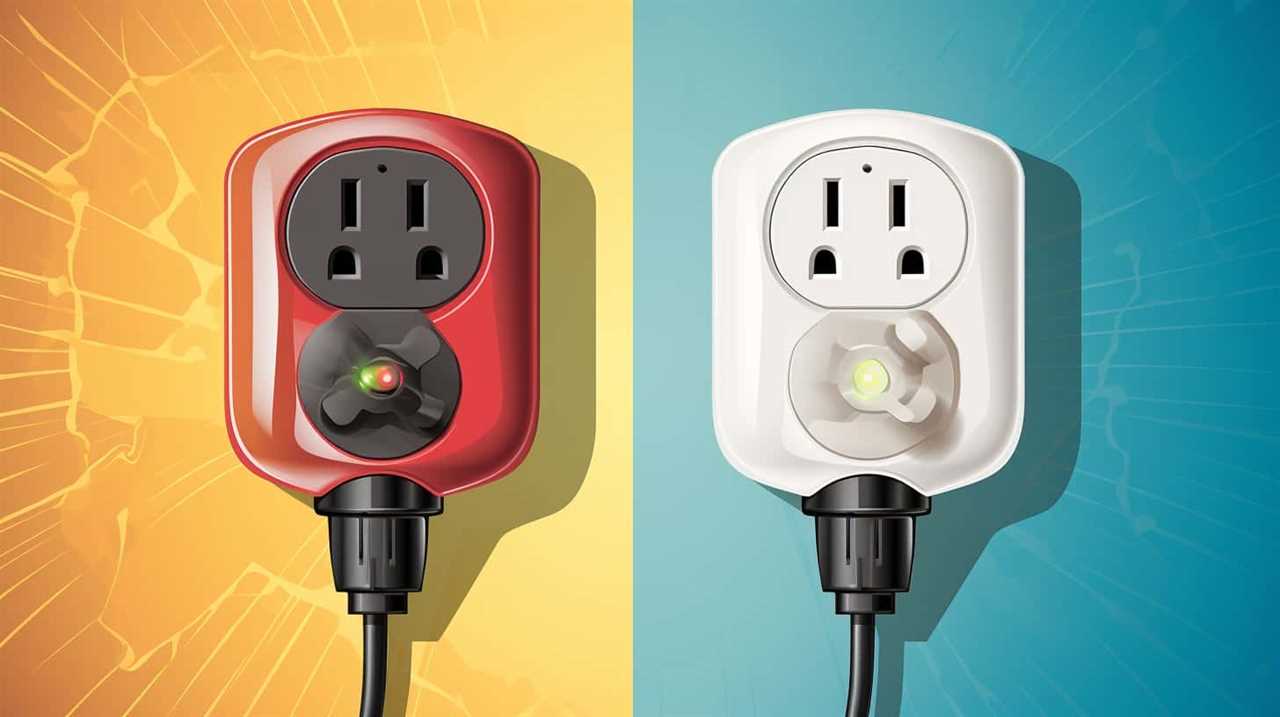
Impact on Appliance Lifespan
Reducing energy consumption by unplugging appliances can have a significant impact on the lifespan of the devices. By unplugging appliances when not in use, energy usage is minimized, resulting in several benefits.
First, it reduces the wear and tear on the internal components of the appliances, prolonging their lifespan. When appliances are constantly plugged in, they may experience power surges or fluctuations, which can damage sensitive electronic parts.
Second, it reduces the overall energy usage, leading to a decrease in electricity bills. Appliances that are left plugged in consume energy even when not actively being used, contributing to unnecessary energy costs.
Therefore, unplugging appliances when not in use not only extends their lifespan but also decreases energy usage and saves on electricity bills.
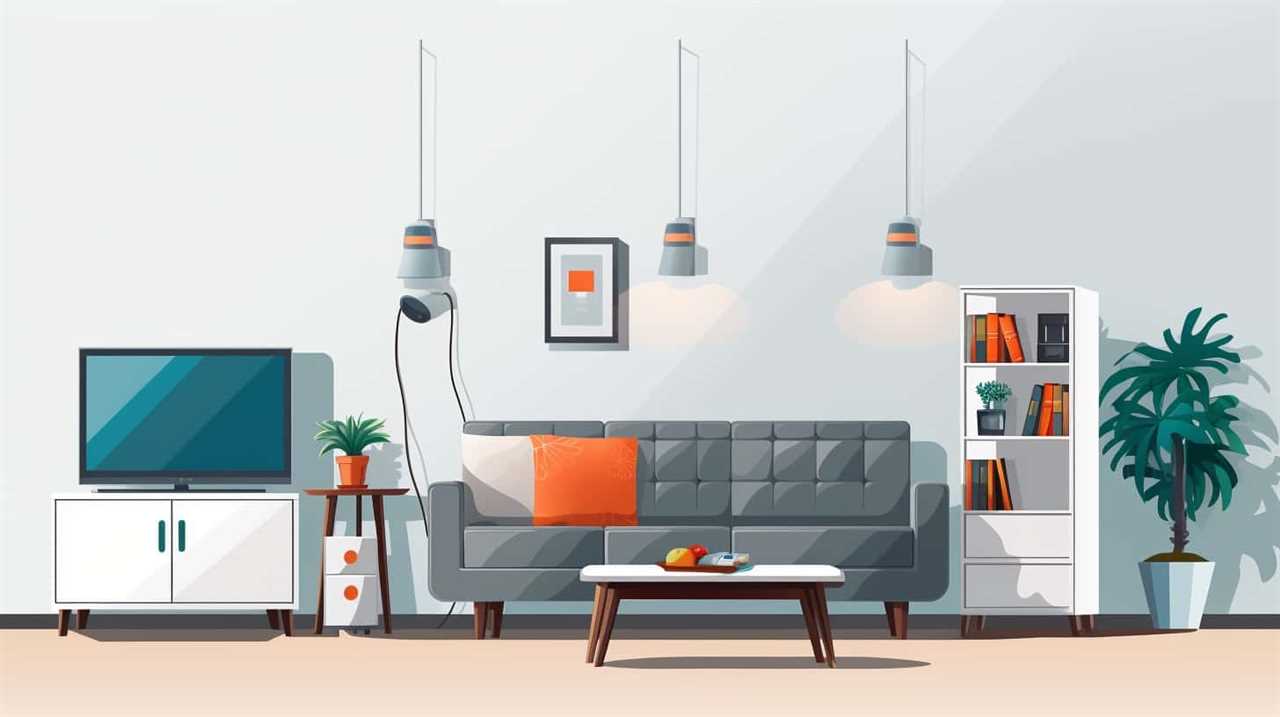
Unplugging Vs Standby Mode?
Using standby mode instead of unplugging appliances can still result in energy consumption and may not be as effective in reducing overall energy usage. While standby mode allows appliances to be quickly turned back on, it also keeps them in a state of readiness that requires a continuous power supply.
Here are some key points to consider when comparing energy consumption between unplugging and using standby mode:
- Standby mode still consumes energy: Even when appliances are in standby mode, they continue to draw a small amount of power to maintain their functions, such as displaying the time or being ready to respond to remote control signals.
- Unplugging eliminates standby power: By completely unplugging appliances, you can eliminate the energy consumed in standby mode, reducing your overall energy usage.
- Energy consumption comparison: Studies have shown that appliances left in standby mode can account for a significant portion of household electricity usage, making unplugging a more energy-efficient option.
The Environmental Impact of Unplugging Appliances
The environmental consequences of disconnecting appliances from power sources are significant. Understanding energy usage and its impact on the environment is crucial in making informed decisions about unplugging appliances.
By unplugging appliances when not in use, individuals can contribute to reducing energy consumption and minimizing greenhouse gas emissions. Appliances that are left plugged in continue to draw power even in standby mode, resulting in what is known as ‘vampire power’ or ‘phantom load.’ This unnecessary energy usage adds up over time and contributes to the overall carbon footprint.

Unplugging Vs. Leaving Appliances on Standby
When comparing unplugging appliances to leaving them on standby, two key points come to light: power consumption and the long-term effects on electronics.
Unplugging appliances completely eliminates any power usage, ensuring no energy wastage.
On the other hand, leaving appliances on standby still consumes a small amount of power, albeit significantly less than when in use.
However, this prolonged standby mode can potentially have negative effects on the lifespan and performance of electronic devices.

Power Consumption Comparison
Frequently, appliances left on standby consume power, leading to a comparison between the power consumption of unplugging and leaving appliances on standby. When it comes to power saving benefits and energy efficiency comparison, it is essential to understand the impact of leaving appliances on standby.
Here are three key points to consider:
- Standby power consumption: Appliances in standby mode continue to draw power, albeit at a lower level. This can contribute to a significant amount of wasted energy over time.
- Unplugging as a solution: Unplugging appliances completely eliminates standby power consumption, resulting in immediate energy savings.
- Convenience vs. energy savings: Leaving appliances on standby offers convenience as they are ready to use instantly. However, this convenience comes at the cost of increased power consumption, while unplugging may require additional effort but ensures energy efficiency.
Long-Term Effects on Electronics
Over time, the long-term effects on electronics differ significantly depending on whether appliances are unplugged or left on standby, with a notable impact on their overall performance and lifespan. Unplugging appliances can have potential dangers, such as power surges when plugging them back in, but it can also help prevent damage caused by electrical storms or faulty wiring. On the other hand, leaving appliances on standby can lead to increased power consumption and unnecessary wear and tear on electronic components. To better understand the effects, consider the following table:
| Unplugging Appliances | Leaving on Standby |
|---|---|
| Reduces power consumption | Increases power consumption |
| Protects against power surges | Increases risk of electrical damage |
| Extends lifespan of electronic components | Shortens lifespan of electronic components |
| Avoids potential dangers | Increases energy costs |
It is important to weigh the potential dangers of unplugging against the long-term effects on electronics to make an informed decision.

How Unplugging Affects the Lifespan of Appliances
Regularly unplugging appliances can impact their overall lifespan. When appliances are left plugged in, they continue to consume a small amount of energy, even when not in use. This constant energy usage can add up over time and contribute to wear and tear on the appliance’s internal components. By regularly unplugging appliances when they are not in use, you can extend their lifespan and reduce energy consumption.
Here are three key reasons why unplugging appliances can positively impact their lifespan:
- Reduces energy usage: Unplugging appliances eliminates standby power consumption, also known as vampire power, which can account for up to 10% of a household’s electricity usage. By cutting off this unnecessary energy drain, appliances can operate more efficiently and last longer.
- Minimizes wear and tear: When appliances are constantly plugged in, they are subject to internal heating and cooling cycles, which can cause stress on components such as capacitors and transformers. Unplugging appliances when not in use prevents these cycles and reduces the likelihood of premature component failure.
- Decreases potential electrical hazards: Unplugging appliances reduces the risk of electrical fires or other accidents caused by faulty wiring or power surges. By disconnecting appliances from the power source, you eliminate the chance of a sudden power surge damaging the appliance or causing a hazardous situation.
Understanding how unplugging appliances affects their lifespan is crucial for maximizing their longevity and minimizing energy consumption. Now, let’s explore the potential risks of not unplugging appliances and how they can impact both your appliances and your home.
Potential Risks of Not Unplugging Appliances
Not unplugging appliances can pose potential risks to their functionality and safety.

When appliances are left plugged in, they continue to consume a small amount of electricity even when not in use. This standby power consumption, also known as vampire power, can lead to higher energy bills and contribute to environmental pollution.
Additionally, leaving appliances plugged in increases the risk of potential hazards such as electrical fires and electric shocks. Faulty wiring or power surges can cause appliances to malfunction and overheat, increasing the likelihood of a fire. Moreover, if an appliance is accidentally turned on or touched while still plugged in, it can result in electric shocks, which can be fatal in some cases.
Therefore, it is crucial to prioritize electrical safety by unplugging appliances when they are not in use to mitigate these potential risks.
Unplugging Appliances for Safety Reasons
To ensure optimal safety and prevent potential hazards, it is imperative to disconnect appliances from power sources when they are not in use. Leaving appliances plugged in can pose several risks, including electrical fires, power surges, and damage to the appliance itself. By unplugging appliances, you can enjoy the following benefits:

- Reduced risk of electrical fires: When appliances are left plugged in, they can overheat, leading to electrical fires. Unplugging them eliminates this risk and promotes a safer environment.
- Protection against power surges: Power surges can occur unexpectedly and cause damage to appliances. By disconnecting them from power sources, you can safeguard your appliances from these surges and extend their lifespan.
- Energy conservation: Appliances that are left plugged in continue to consume energy, even when not in use. Unplugging them helps reduce energy waste, saving you money on your utility bills.
Unplugging Appliances During Power Outages
During power outages, it is important to unplug appliances to protect them from potential damage and ensure their safe operation. Power outages can be caused by various factors, such as severe storms or electrical system failures. Unplugging appliances during these events is crucial because power surges can occur when the electricity is restored, which can damage sensitive electronic components.
Additionally, power fluctuations during storms can also pose a risk to appliances if they are left plugged in. Unplugging appliances during vacations is also recommended to save energy and reduce the risk of electrical fires caused by faulty wiring or malfunctioning appliances.
Tips for Efficiently Unplugging Appliances
When unplugging appliances, it is important to follow these tips to ensure efficient and safe removal of power:
- Unplug when not in use: To reduce standby power consumption, unplug appliances when they are not being used. This simple step can help save energy and lower electricity bills.
- Use power strips: Plug multiple appliances into a power strip, and then turn off the strip when the appliances are not needed. This prevents standby power consumption and makes it easier to unplug multiple appliances at once.
- Consider smart plugs: Smart plugs can automatically turn off power to appliances based on a schedule or using voice commands. This convenient technology helps reduce standby power and allows for efficient unplugging.
Making an Informed Decision About Unplugging Appliances
Before deciding whether to unplug your appliances, it is essential to consider the potential impact on their functionality and lifespan. Making informed decisions about unplugging appliances involves understanding the benefits that it can bring.
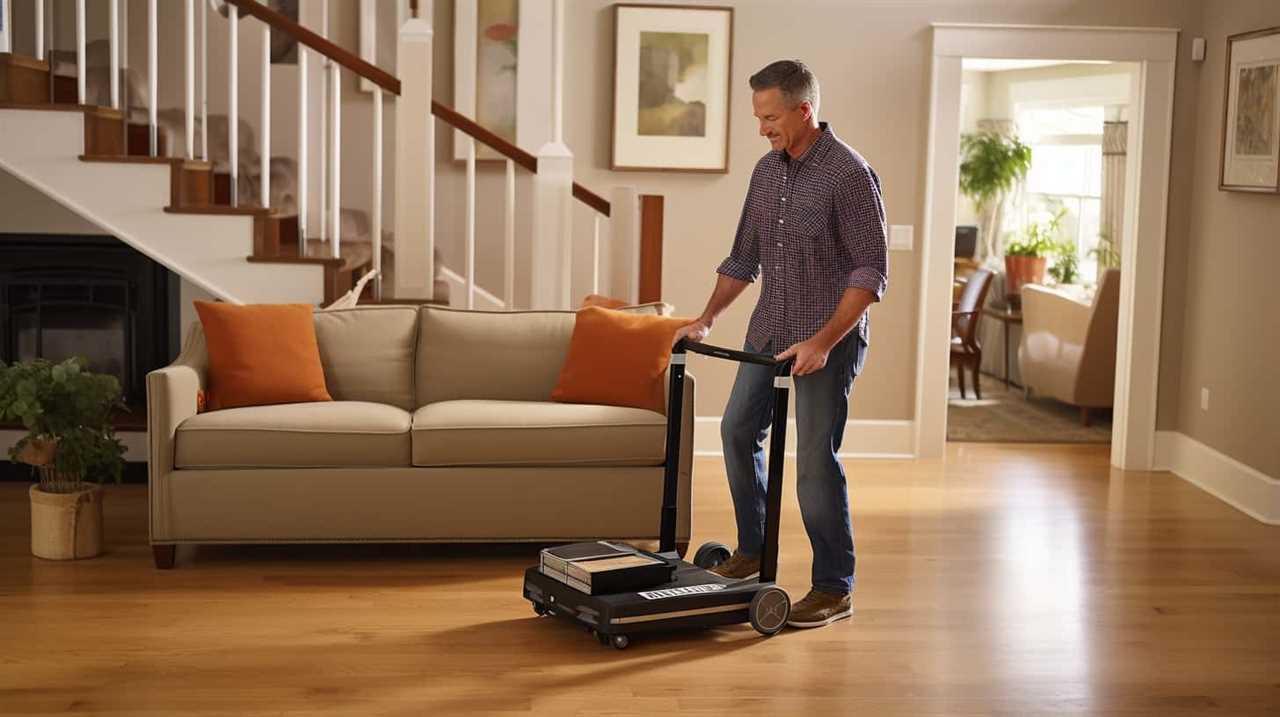
Unplugging appliances when not in use can help save energy and reduce electricity bills. Many appliances, such as televisions, computers, and microwaves, consume standby power even when not actively being used. By unplugging them, you can prevent this unnecessary energy drain and reduce your environmental footprint.
Additionally, unplugging appliances can protect them from power surges and electrical fires, as well as extend their lifespan by reducing wear and tear caused by constant power supply.
However, it is important to note that not all appliances need to be unplugged. Certain appliances, such as refrigerators and alarm systems, require continuous power supply to function properly. Therefore, it is crucial to assess each appliance individually and make an informed decision based on its specific requirements.
Frequently Asked Questions
Can Unplugging Appliances Reduce the Risk of Electrical Fires?
Unplugging appliances can significantly reduce the risk of electrical fires by reducing energy consumption and preventing electrical accidents. By disconnecting them from power sources when not in use, the potential for overheating and electrical malfunctions is minimized.

Is It Necessary to Unplug Appliances When Not in Use to Prevent Power Surges?
Unplugging appliances when not in use is essential to prevent power surges and protect appliances from potential dangers. Additionally, it reduces the environmental impact of leaving them plugged in, promoting energy efficiency and sustainability.
Can Unplugging Appliances Save Money on Energy Bills?
Unplugging appliances when not in use can have a significant long-term impact on overall energy consumption, resulting in potential savings on energy bills. Comparing energy savings between unplugging appliances and using energy-saving modes can further inform energy-conscious individuals.
Does Unplugging Appliances Prolong Their Lifespan?
Unplugging appliances can potentially prolong their lifespan. By reducing energy consumption and minimizing environmental impact, unplugging appliances helps to optimize their performance and minimize wear and tear, ultimately enhancing their longevity.
Are There Any Appliances That Should Not Be Unplugged?
Appliances are generally designed to be unplugged when not in use, as this can reduce energy consumption and minimize the risk of electrical hazards. However, there may be certain appliances, such as refrigerators or alarm systems, that should always remain plugged in for continuous operation.
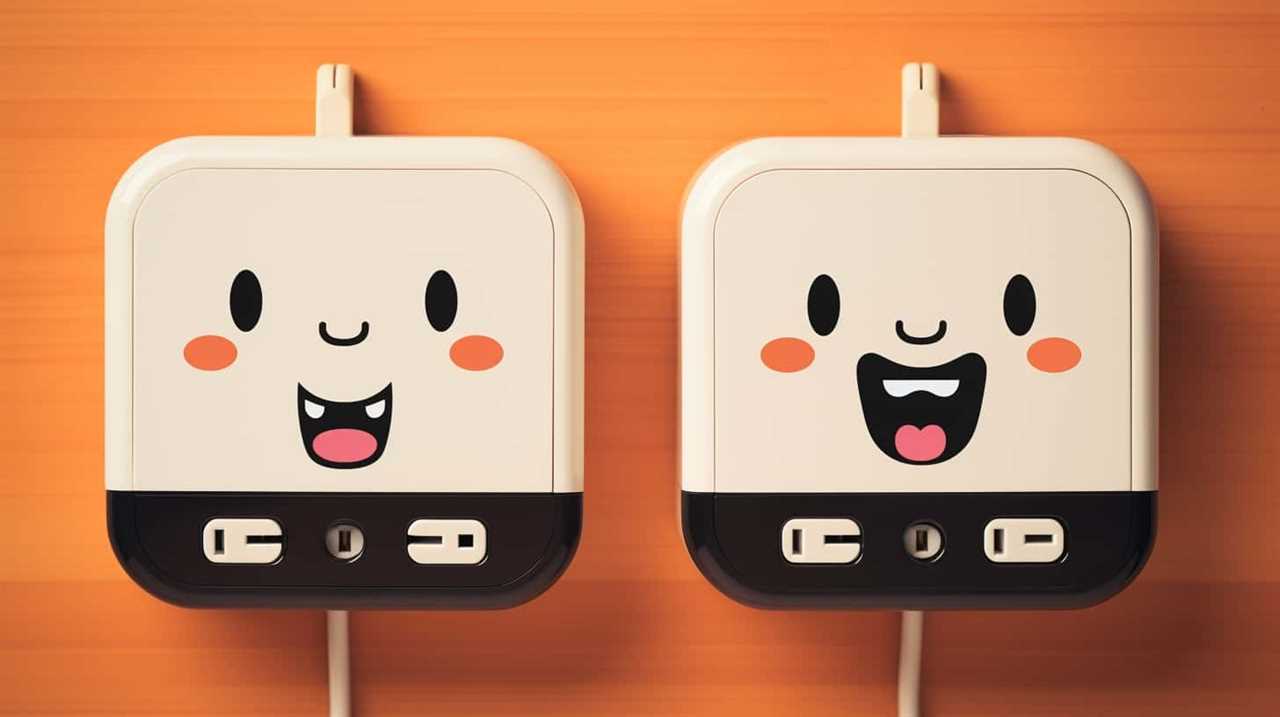
Is Unplugging Appliances a Good Way to Save Electricity Without Damaging Them?
Yes, unplugging appliances saves electricity, as they continue to consume energy when left plugged in. This simple action not only reduces energy usage, but also minimizes the risk of damage caused by power surges. It’s an easy and effective way to save on electricity without harming your appliances.
Conclusion
In conclusion, the notion that unplugging appliances can damage them is a common misconception. On the contrary, unplugging appliances can have numerous benefits, such as reducing energy consumption and ensuring safety during power outages.
Despite some concerns about wear and tear, the impact is minimal. By efficiently unplugging appliances when not in use, individuals can make an informed decision that promotes energy efficiency and overall well-being.


